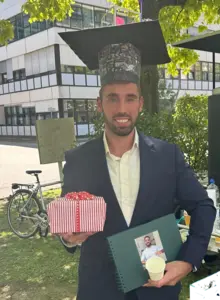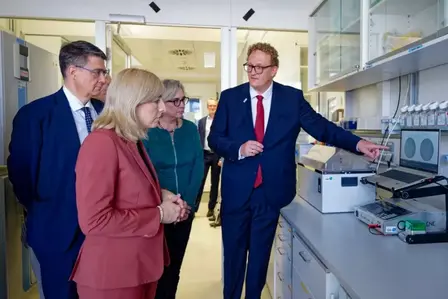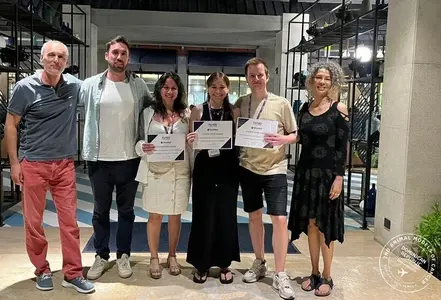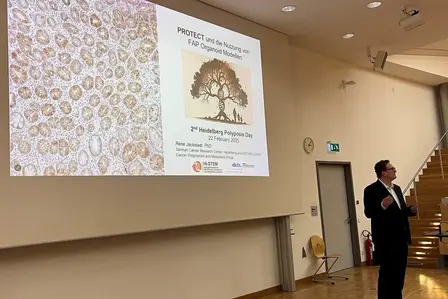Cancer Progression and Metastasis
- Cell and Tumor Biology
- Junior Research Group

Dr. Rene-Filip Jackstadt
Junior Group Leader
Colorectal cancer (CRC) is the second leading cause of cancer-related deaths, with metastasis driving mortality. Utilizing next-generation pre-clinical models and comprehensive CRC patient biobanks, we decipher cellular and molecular programs leading to metastasis and therapy resistance. We rapidly translate discoveries into clinical trials, emphasizing also reverse translational research to refine and improve treatments.
Image: © Rene-Filip Jackstadt

Image: © Rene-Filip Jackstadt
Our Research
Metastasis is a multistep process, with a complex evolution, where cells leave the primary tumor and seed to distant organs. Every step during metastasis adds considerable heterogeneity to the tumor and includes the acquisition of stem cell features. These cancer stem cell populations have distinct molecular, genetic and phenotypic features, which jointly increase the risk of therapy resistance. However, the tumor microenvironment can control phenotypic plasticity of cancer stem cells.
We utilize unbiased multi-omics (transcriptome, epigenome, methylome) at single cell level, functional genomics and lineage tracing approaches to analyze stem cell plasticity with complex in vivo models of metastatic colorectal cancer. These genetically engineered mouse models contain alterations and show progression similarly to human metastatic colorectal cancer. Further, these models allow tumor progression in the native tumor microenvironment, which enables us to investigate the role of non-cell-autonomous factors that control cancer stem cells features during metastasis. Our lab has a strong expertise in the use of genetically engineered mouse models, to analyze each step of molecular and cellular changes during the metastatic process longitudinally and in response to therapy. We also use primary clinical samples and patient derived organoids to better understand the most lethal stages of the disease.
To understand the mechanisms of colorectal cancer progression this division will focus on the following major topics:
- Functional characterization of cancer stem cells in tumor-evolution
- Molecular and cellular basis of cancer stem cell niches
- Analysis of cancer stem cells and the interaction with the tumor microenvironment as driver of therapy resistance
Our research will broaden our understanding of the mechanisms that control colorectal cancer progression and will help to find therapeutic vulnerabilities of late stage cancers.
Projects
TROPHIT1 is an open label, randomized, multicenter phase II/III trial to investigate the efficacy of Sacituzumab Govitecan a TROP2 targeting anti-body drug conjugate in metastatic colorectal cancer.
TROPHIT1 was initiated based on our research findings in collaboration with the National Center for Tumor Diseases (NCT) Heidelberg. We conduct a translational research program, including single cell sequencing, liquid biopsy analysis and spatial transcriptomics to unravel determinants of cellular plasticity and therapy response.
https://www.esmogastro.org/article/S2949-8198(24)00079-7/pdf
The DKTK Organoid Platform is a Strategic Initiative of the DKTK consortium to utilize patient-derived organoids (PDO) for translational cancer research. Main goals are to develop personalized tumor models, link the clinical course and treatment response of patients with organoid phenotypes including drug sensitivity and to foster technological innovation.
In MetPredict, PDOs from multiple liver metastases of colorectal cancer will be generated to study the inter-metastatic heterogeneity and to model metastatic relapse after liver surgery. Systematic molecular and functional characterization will be performed to understand the underlying biology of the patients’ clinical behavior.
https://dktk.dkfz.de/forschung/joint-funding-programm/strategische-initiativen/details/48/7825

The SATURN3 program aims to develop insights into intratumoral heterogeneity (ITH) of hard-to-treat solid tumors as a key source of therapy resistance. The consortium addresses a critical gap in current therapeutic approaches by integrating multidimensional ITH considerations.
We focus within SATURN3 to investigate spatially mapped and longitudinally collected samples from colorectal cancer using single-cell, spatial, and bulk multi-omics profiling. This approach, coupled with multisite organoid (PDO) models, aims to uncover dynamic genetic and non-genetic tumor states, investigate ITH-mediated resistance and metastasis, and identify new therapeutic targets.
With the project Progression and Transformation of Early Colorectal Cancer and Therapy (PROTECT), we investigate the determinants of malignant transformation from normal and pre-cancerous stages into colorectal cancer.
Timing of tumor ages and cell-of-origin characterization in early-onset colorectal cancer (EO-CRC) patients aims to uncover novel mechanisms of EO-CRC progression and treatments. Complex longitudinal patient specimens are collected with the Department of Gastroenterology, Hepatology and Infectious Diseases at the University Hospital Heidelberg.
EX vivo Therapy Response Assessment (EXTRA) is a joint and cooperative project of theUniversity Hospital Heidelberg, the National Center for Tumor Diseases (NCT) and DKFZ in cooperation with XILIS Inc.
The project aims to investigate the potential of MicroOrganoSpheres™ (MOS) in predicting therapy response in gastrointestinal cancers. EXTRA is a single center prospective sample collection study.
Team
-

Dr. Rene-Filip Jackstadt
Junior Group Leader
-

Ioannis Chiotakakos
PhD Student
-

Gabriele Diamante
PhD Student
-

Raja Flüchter
Research Assistant
-

Nikolaos Georgakopoulos
PhD Student
-

Aitana Guiseris Martinez
PhD Student
-
Sandra Jaun
-

Manuel Mastel
Postdoc
-

Jasmin Meier
Lab Manager
-

Luisa Nader
Clinician Scientist
-

Gabriele Schmidt
Research Assistant
-

Thorben Söhngen
PhD Student
Selected publications
Gobits R, Schleußner N, Oliver GR, Rutenberg Schoenberg M, de Jesus Domingues AM, Ramkumar P, Suen SWF, Koomen MPM, Paolucci F, Martens K, Guiseris Martinez A, Volk J, Artmann C, Mastel M, Ouyang KS, Kloor M, Bankaitis ED, Stoub HE, Puschhof J, Brown K, Pretzer S, Nelson DA, Struminger E, Zessin A, Brown A, Evans C, Yetsko D, Harrington M, Salg G, Schneider M, Schmidt T, Helman E, Plenker D, Barnett C, Jones RT, Köhler B, Driehuis E, Jackstadt R.
B.C. Köhler, G.M. Haag, L. Le Cornet, P. Hoffmeister-Wittmann, M. Schmidt, A. Manjunath, N. Vaquero-Siguero, M. Jenzer, M. Gimmel, A. Stahler, A. Stein, M. Reichert, S. Kasper, M. Bitzer, D. Jäger, C. Springfeld, T.F. Weber, S. Fröhling, K. Steindorf, A. Trumpp, R.F. Schlenk, R. Jackstadt
Sigrid K. Fey, Nuria Vaquero-Siguero, Rene Jackstadt
Hutton C, Heider F, Blanco-Gomez A, Banyard A, Kononov A, Zhang X, Karim S, Paulus-Hock V, Watt D, Steele N, Kemp S, Hogg EKJ, Kelly J, Jackstadt RF, Lopes F, Menotti M, Chisholm L, Lamarca A, Valle J, Sansom OJ, Springer C, Malliri A, Marais R, Pasca di Magliano M, Zelenay S, Morton JP, Jørgensen C
Jackstadt R, van Hooff SR, Leach JD, Cortes-Lavaud X, Lohuis JO, Ridgway RA, Wouters VM, Roper J, Kendall TJ, Roxburgh CS, Horgan PG, Nixon C, Nourse C, Gunzer M, Clark W, Hedley A, Yilmaz OH, Rashid M, Bailey P, Biankin AV, Campbell AD, Adams DJ, Barry ST, Steele CW, Medema JP, Sansom OJ
Open Positions
Our research group is always looking for enthusiastic team members.
Postdoctoral researchers: Please apply through the DKFZ Postdoctoral Fellowship or contact Rene Jackstadt by email and include a cover letter outlining your research interests, your CV with a complete publication list, and the contact details of three references.
Clinician/Physician scientists: Please apply through the DKFZ Clinician Scientist Program and also send your application directly to Rene Jackstadt.
Doctoral students: Please use the International PhD Program at DKFZ to apply and simultaneously send your application to Dr. Rene Jackstadt.
Congratulations on your PhD
We warmly congratulate Manuel Mastel on successfully completing his PhD and are very happy with him about this great achievement.

Visit by Federal Minister of Health Nina Warken
On Monday, July 21, Federal Minister of Health Nina Warken visited the German Cancer Research Center (DKFZ).
She learned about the progress and latest developments in cancer research and gained insights into the metastasis of tumors.

Posterprize for Manuel Mastel
Manuel won the prize for best scientific poster at the 2nd animal models of cancer conference 2025 in Punta Cana, Dominican Republic.
Congratulations!!!

PhD Scholarship
The Merck Society for Arts and Science has awarded Aitana Guiseris Martinez the doctoral scholarship in translational medicine this year. We congratulate her on this recognition.

2nd Heidelberg Polyposis Congres
On Saturday, February 22, 2025, the 2nd Heidelberg Polyposis Congress took place at the University Hospital Heidelberg.
Under the title "This is why we need research," the interdisciplinary project PROTECT (Progression and Transformation of Early Colorectal Cancer and Therapy) was presented.

Congratulations on your PhD
We warmly congratulate Nuria Vaquero Siguero on successfully completing her PhD and celebrate with her the outstanding achievement of "Summa Cum Laude."

Get in touch with us

